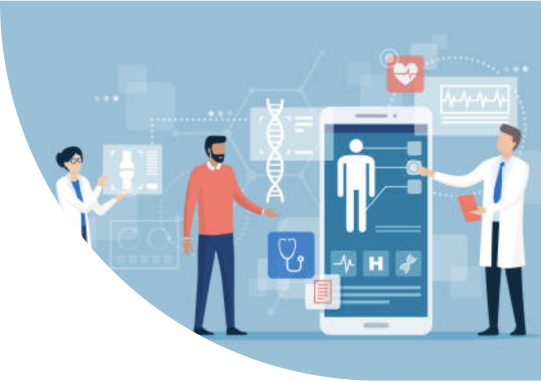Cancer Genetics Clinic
Contact Us
Please note a referral letter is required before an appointment can be confirmed.
Useful Information
About our services
The Mater Private Cancer Genetics Service is Ireland’s first private cancer genetics clinic providing genetic testing and counselling for hereditary cancer risk, in line with best international practice.
The aim of this service is to identify individuals with a genetic predisposition to cancer through genetic testing and to promote the prevention or early diagnosis of cancer in individuals with an increased risk of cancer due to an inherited cause.
There are two key elements to our service: hereditary cancer risk counselling and genetic testing.
Hereditary cancer risk counselling
Hereditary cancer risk counselling involves a discussion of your personal and/or family history of cancer. At Mater Private Network, cancer risk counselling is provided by Prof. David Gallagher, cancer geneticist, and Michael Farrell, clinical nurse specialist in cancer genetics.
The goal of cancer risk counselling is to provide clear and clinically relevant information about genetic risk factors in an atmosphere of support and education. Your initial one-to-two-hour session will focus on questions and concerns about your or your family’s risk of cancer. As part of a hereditary cancer risk counselling session you will learn about and discuss:
- Your individual cancer risk assessment
- The latest advances in cancer genetics
- Personalised cancer screening recommendations and referrals
- The risks, benefits, and limitations of genetic testing
- Options for participating in research
- Referrals to clinicians who provide psychological counselling for individuals and families who need assistance to cope with the challenges that may arise during counselling and testing
Counselling is typically recommended for individuals who have been diagnosed with cancer at unusually young ages or who have multiple family members who have been diagnosed with cancer.
Genetic testing is not required and may not be useful for everyone receiving counselling. You may also decide after the counselling that genetic testing is not for you.
Genetic testing
Genetic testing involves the use of laboratory methods to obtain a more precise estimate of your cancer risk. Although a cancer risk assessment can be provided without genetic testing, in some cases testing may help clarify your cancer risk. Genetic testing results may help you and your physician to make important decisions about your medical care. Deciding whether or not to have genetic testing is a personal choice and can be made at the time of your counselling session or at a future date.
What genes does the cancer genetics service test?
There are genes that increase the risk of breast and ovarian cancer. Gene mutations BRCA1 (BReast CAncer 1) and BRCA2 (BReast CAncer 2) pose the highest lifetime risks for breast and ovarian cancer for women and prostate and breast cancer risk for men.
These genes function as tumour suppressors which means they work to prevent cancers. If there is a mutation of the BRCA1 or BRCA2 genes, some of this natural protection is lost. Gene mutation can indicate a higher risk of cancer, but this does not mean you will definitely develop cancer.
There are other genes that increase the risk for cancer such as ATM, BRIP1,CHEK2, PALB2 and TP53. There are also genes called mismatch repair (MMR) genes that when mutated cause Lynch syndrome. This the most common inherited risk for colorectal cancer for men and women and endometrial (womb) cancer for women.
We offer both diagnostic and predictive genetic testing for patients. Diagnostic testing determines if a patient has a cancer gene mutation. This patient is typically the first individual within their family to undergo genetic testing following a discussion on the benefits, risks and outcomes of testing. Predictive testing refers to subsequent testing for family members of the patient who was initially tested and found to have a cancer gene mutation.
- What are the latest medical and surgical options for prevention or early detection of hereditary forms of cancer?
- Are the treatments for hereditary cancers different from those for non-hereditary cancers?
- If I am at an increased risk of developing cancer, what will the risk for my family be?
- Am I eligible to receive genetic testing as part of a clinical research study?
- What are the options for medical insurance coverage or reimbursement for hereditary cancer risk counselling and genetic testing?
Here are some important questions for you to consider. If you answer yes to any of the following questions, hereditary cancer risk counselling may be useful for you.
- Have you or a close relative been diagnosed with cancer at an early age?
- Do you have more than one relative with the same type of cancer? If yes, is the same type of cancer found in more than one generation?
- Has any one person in your family had more than one type of cancer?
- Has anyone in your family been diagnosed with bilateral (both sides) cancer of paired organs (e.g., breasts, ovaries, kidneys)?
- Are you related to someone who is known to have an inherited mutation that can cause cancer?
The Mater Private cancer genetics service will treat your concerns with sensitivity and support.
We understand that many factors must be considered when discussing cancer risk, including your personality, method of coping, and your family’s experience with cancer. Our counsellors and staff will tailor each consultation to fit your specific needs.
During your visit, you can learn about the current status of Irish and International legislation covering the risk of discrimination if you have had genetic testing for cancer.
In Ireland, under Part 4 of the 2005 Disability Act, your genetic test results – regardless of whether they are positive or negative - cannot be used in relation to employment, insurance, pension arrangements, or the mortgage of a property.
Although there are risks, this should not be seen as a barrier to hereditary cancer risk counselling or testing. We will discuss the latest news on this with you during the consultation.







.jpg?sfvrsn=97847083_1)


